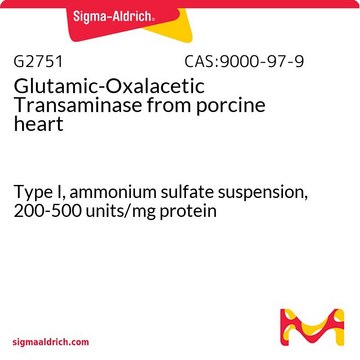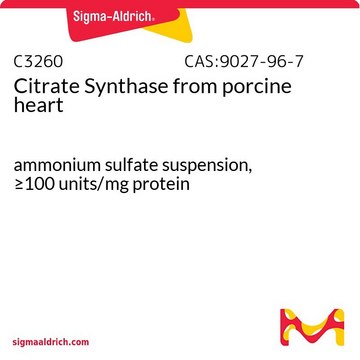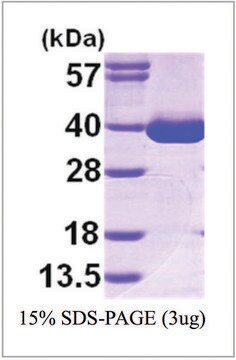LMDH-RO
Roche
L-Malate Dehydrogenase (L-MDH)
from pig heart (mitochondrial)
About This Item
Produits recommandés
Source biologique
Porcine heart (mitochondrial)
Niveau de qualité
Forme
solution
suspension
Activité spécifique
~1200 units/mg protein (At 25 °C with oxaloacetate as the substrate.)
Conditionnement
pkg of 1 mL (10127248001 solution)
pkg of 1 mL (10127256001 suspension)
pkg of 5 mL (10127914001suspension)
Fabricant/nom de marque
Roche
Technique(s)
activity assay: suitable
Couleur
white
pH optimal
7.4-7.5(reduction of oxaloacetate)
9.2-9.5(oxidation of malate)
Solubilité
water: miscible
Adéquation
suitable for Western blot
Numéro d'accès NCBI
Numéro d'accès UniProt
Application(s)
life science and biopharma
Activité étrangère
Fumarase <0.01%
GIDH 0.001%
GOT 0.001%
GPT 0.00185%
LDH <0.01%
NADH oxidase <0.001%
Conditions d'expédition
wet ice
Température de stockage
2-8°C
Informations sur le gène
Porcine ... MDH2(397039)
Description générale
The L-malate dehydrogenase enzyme is a nuclear gene product that is synthesized with a 24-residue amino-terminal signal peptide. This peptide is proteolytically cleaved during the translocation of the enzyme to the mitochondrial matrix.
Application
Actions biochimiques/physiologiques
Qualité
Forme physique
Notes préparatoires
– arsenate
– Mg2+
– Zn2+
Autres remarques
Code de la classe de stockage
12 - Non Combustible Liquids
Classe de danger pour l'eau (WGK)
WGK 1
Point d'éclair (°F)
No data available
Point d'éclair (°C)
No data available
Certificats d'analyse (COA)
Recherchez un Certificats d'analyse (COA) en saisissant le numéro de lot du produit. Les numéros de lot figurent sur l'étiquette du produit après les mots "Lot" ou "Batch".
Déjà en possession de ce produit ?
Retrouvez la documentation relative aux produits que vous avez récemment achetés dans la Bibliothèque de documents.
Les clients ont également consulté
Notre équipe de scientifiques dispose d'une expérience dans tous les secteurs de la recherche, notamment en sciences de la vie, science des matériaux, synthèse chimique, chromatographie, analyse et dans de nombreux autres domaines..
Contacter notre Service technique








